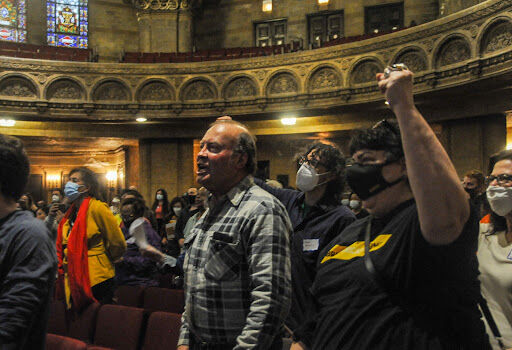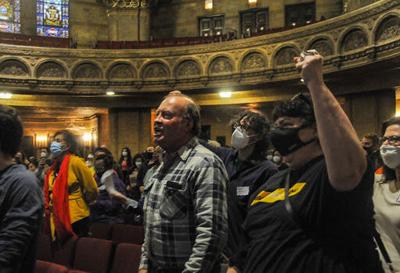After a two-year lull, activists seeking city funds for the homeless launched a new campaign Wednesday night in their contest with Mayor Lori Lightfoot. A well-attended “town hall” meeting in Kenwood was the first of four designed to put heat on a few of the City Council’s most influential members — in this case, Alds. Sophia King (4th), Leslie Hairston (5th), Pat Dowell (3rd) and Gregory Mitchell (7th), all of whom either declined to attend or did not respond to the event invitation.
Highlighting their absence, organizers planted four chairs near the podium at KAM Isaiah Israel synagogue, 50th St. and Greenwood Ave., and placed a cardboard cut-out of an alderman on each chair.
King leads the 18-member Progressive Caucus. Gathering in her ward was no accident, said Jimmy Rothschild of the Jewish Council on Urban Affairs, one of those organizing the town halls on behalf of Bring Chicago Home (BCH), a coalition of local groups.
“We’re targeting alders who have influence in the Progressive, Latino and Black Caucuses,” said Rothschild. (Hairston is also a member of the Progressive Caucus, as is local Ald. Jeanette Taylor, who has backed the proposal since its inception)
The BCH proposal, first floated in 2018 by the Chicago Coalition for the Homeless, would restructure the Real Estate Transfer Tax (RETT) in the city, with new revenue earmarked exclusively for people experiencing homelessness. Lightfoot endorsed a proposal to restructure the RETT to raise revenue for affordable housing during her mayoral campaign. But after the election she withdrew her support for the earmark, preferring to retain control over how the new revenue would be spent.
A battle ensued in Springfield late in 2019, with Lightfoot asking state legislators to permit a tax change that would continue to direct all revenues to Chicago’s general municipal fund. Chicago Democrats held out for the earmark. Without a compromise between the two Chicago factions, no legislation could pass.
The activists now want City Council to vote their proposal onto a November ballot referendum for Chicagoans. Polling and projections suggest such a referendum would pass, BCH representatives say, giving the Council the power to levy the funds. But the mayor’s opposition may not be easily overcome.
Lacking elected officials, Wednesday’s putative town hall became a rally. Of the 150 people in the crowd, about 40 percent were from the 4th or 5th wards. Speakers acted as cheerleaders, raising fists and shouting slogans as the audience joined in. “It’s not that housing should be a human right,” several repeated. “It is a human right.”
Music from the Kenwood Academy Jazz Band, and from an African drummer, set the tone for testimony from speakers with lived experience of homelessness.
Maxica Williams was raising three children on her own in 2015, when she lost her house. She was subsequently diagnosed with cancer and depression. She spoke of her longing, back then, for “the feeling of having a key to unlock a private space, a space of peace and tranquility, away from all that is happening in the world.”
Diavionne “China” Brown, 21, left home at 17 to escape abusive parenting. “First it was my mom. Then she died, and my dad, he didn’t even want to be there. The abuse was mostly psychological, but it could suddenly turn physical. That’s when I decided to get out. Homelessness was part of the deal.
“I couldn’t really tell the police, because I had siblings at home.”

China Brown, 21, became homeless when she fled domestic abuse at 17. She was finally placed in permanent housing a few months ago.
She home-hopped from one relative to another. The last, an aunt, “was pretty awful. She put me out in January of 2020.” At that point, Brown’s only alternative was the street.…until she found limited refuge at Ujima Village in Englewood, the one area shelter dedicated exclusively to serving homeless youth aged 18-24.
Anne Holcomb, manager of Ujima Village, lamented the lack of funding to expand the hours at the 24-bed shelter. It currently operates overnight, from 8 p.m. to 8 a.m. She noted that thousands of youth go homeless in Chicago. “Without permanent housing, they can sleep in shelters or on trains, or trade sex for a couch.”
At shelters in general, Brown said “the cons outweigh the pros.” She praised Ujima Village but noted that her life was threatened twice during the time she was sleeping there.
Unhoused young people have an even tougher time getting help than adults. Brown said youth and homelessness invalidate each other in people’s minds. “People don’t take you seriously. They say, ‘OK, that’s rebellion. Just apologize to your parents and go home.’ I spent a lot of time defending myself, explaining to people why I had to be homeless.”
In a telephone interview, Ald. King bristled at the suggestion that she was not behind the BCH proposal. “I brought them to last month’s meeting of the (Progressive) caucus,” she said. “I thought we had a good conversation and we were all on the same page.
“We’re not only on board, we’re leading it.”
King did, however, acknowledge a significant sticking point: While BCH wants 100 percent of the new tax revenues to fund housing and services for the homeless, the caucus has “other priorities.”
“We still have to work out how much should go toward homelessness and how much toward other things,” King said.
Julie Dworkin, director of policy with the Chicago Coalition for the Homeless, was one of those attending the caucus meeting.
“Ald. King doesn’t say what these ‘other things’ are,” she said. “We asked them to either back us on the 100 percent, or show us a counterproposal. They haven’t yet done either.” She said King called it “unrealistic” to ask for 100 percent. “We’re willing to negotiate with the mayor on that, but they should be with us on the starting point.”
“We told (the caucus members) that we’d be continuing our campaign as these discussions go on.”
King said she would have liked to attend Wednesday’s gathering, and had asked BCH to work with her to find a better date.
Dworkin disputed King’s account. “These town halls have been in planning for months,” she said. “It was a top priority for us to have her there, and we made tons of efforts. If she had told us she really wanted to be there, we would have considered a different date.”
Dworkin shared a long email thread between King’s office and Jimmy Rothschild of the Jewish Council on Urban Affairs concerning the town hall. It began with BCH’s invitation to King on Feb. 16. Her staff responded with an event form to be filled out, and on March 2, in response to another query, said “We are still reviewing the request.” On March 15, eight days before the town hall, King’s office responded to another query with “No update yet.”
The day before the forum, Dworkin said, someone at King's office told a staffer at KAMII that she would not be able to make the event because she was attending Lightfoot's South Side public safety forum.
King suggested that crossed wires may have been at the heart of the issue: “The communication seems to be a little bit disjointed.”





(0) comments
Welcome to the discussion.
Log In
Keep it Clean. Please avoid obscene, vulgar, lewd, racist or sexually-oriented language.
PLEASE TURN OFF YOUR CAPS LOCK.
Don't Threaten. Threats of harming another person will not be tolerated.
Be Truthful. Don't knowingly lie about anyone or anything.
Be Nice. No racism, sexism or any sort of -ism that is degrading to another person.
Be Proactive. Use the 'Report' link on each comment to let us know of abusive posts.
Share with Us. We'd love to hear eyewitness accounts, the history behind an article.